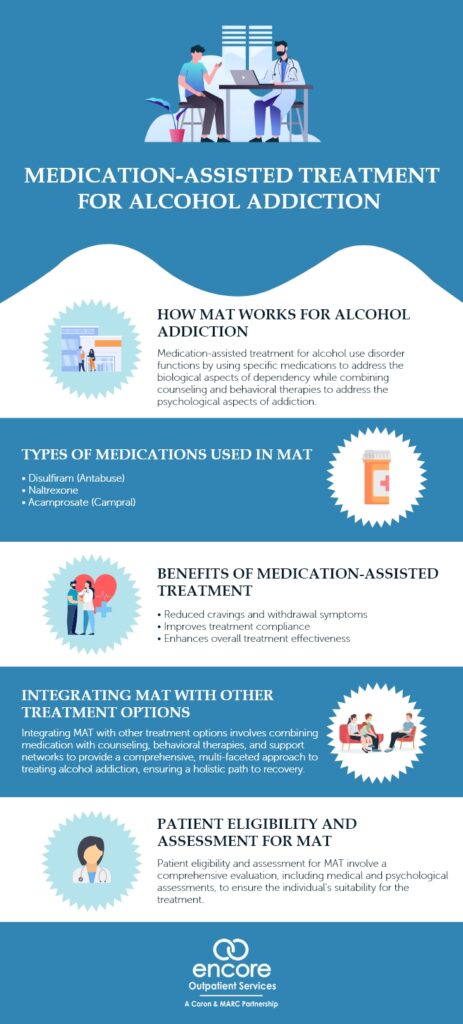Alcohol addiction is a complex condition affecting millions of individuals worldwide, often leading to significant personal, social, and health consequences. While various interventions are available for addressing alcohol use disorder (AUD), medication-assisted treatment (MAT) stands out as a promising approach for managing cravings, alleviating alcohol withdrawal symptoms, and facilitating sustained recovery. MAT combines medication with counseling and behavioral therapies to treat substance use disorders, offering a comprehensive approach to recovery. This article examines the types of medications used, how MAT functions in treating alcohol addiction, its benefits, and how it integrates with other treatment modalities. Understanding MAT is crucial for those seeking effective tools in the battle against alcohol use disorder, and this post aims to provide clear, informative insights into this treatment approach.
Understanding Alcohol Addiction
Alcohol addiction, also known as alcohol use disorder, is a chronic condition characterized by the uncontrollable urge to consume alcohol despite its negative effects on one’s health and life. It involves changes in the brain’s chemistry that lead to dependence and cravings, making it challenging for individuals to abstain. According to the National Institute on Alcohol Abuse and Alcoholism (NIAAA), alcohol use disorder affects around 29.5 million people in the United States. This includes 17.4 million males and 12.2 million females aged 12 and older.
This condition often develops gradually and can be influenced by various factors, including genetics, lifestyle, environmental influences, and psychological conditions. Recognizing alcohol use disorder is crucial as it paves the way for seeking appropriate treatment.
Symptoms of alcohol addiction include:
- Strong cravings or urges to drink alcohol.
- Inability to limit or control alcohol use.
- Spending a lot of time drinking, obtaining alcohol, or recovering from its effects.
- Developing a tolerance to alcohol (needing more alcohol to achieve the same effect).
- Neglecting responsibilities at work, school, or home due to alcohol use.
- Continuing to drink alcohol despite knowing it’s causing physical, social, legal, or interpersonal problems.
- Failing to stop or cut down on drinking despite repeated attempts.
- Experiencing symptoms of alcohol withdrawal.
It’s important to note that the presence and severity of these symptoms can vary, and having several of these symptoms may indicate a need for professional evaluation and treatment.
How MAT Works for Alcohol Addiction
Medication-assisted treatment for alcohol use disorder functions by using specific medications to address the biological aspects of dependency. These medications operate in different ways: some mitigate withdrawal symptoms and cravings, making the recovery process more manageable, while others block the rewarding effects of alcohol, reducing the desire to drink.
By alleviating physical symptoms and reducing psychological cravings, MAT enables individuals to focus more effectively on the behavioral and psychological aspects of recovery through counseling and therapy. This dual approach addresses both the physiological and psychological facets of addiction, providing a well-rounded treatment strategy.

Types of Medications Used in MAT
Several FDA-approved medications are utilized in MAT for alcohol addiction:
- Disulfiram (Antabuse) – This medication discourages drinking by causing unpleasant effects (like nausea and flushing) when alcohol is consumed.
- Naltrexone – This medication is used to reduce the urge or desire to drink by blocking the euphoric effects and feelings of intoxication.
- Acamprosate (Campral) – This medication helps restore the natural balance of neurotransmitters in the brain and is beneficial in reducing alcohol cravings and withdrawal symptoms after cessation.
These medications are used in conjunction with counseling and behavioral therapies to form comprehensive treatment programs for alcohol addiction.
Benefits of Medication-Assisted Treatment
MAT offers several benefits for individuals with alcohol use disorder:
- Reduced Cravings and Withdrawal Symptoms – Medications used in MAT can significantly diminish cravings for alcohol and alleviate withdrawal symptoms, making the recovery process more manageable.
- Improves Treatment Compliance – By mitigating withdrawal symptoms and cravings, MAT can enhance an individual’s ability to adhere to treatment plans and participate actively in counseling or therapy.
- Lowers Risk of Relapse – MAT can reduce the risk of relapse by addressing the physical aspects of addiction, which is crucial for long-term recovery.
- Enhances Overall Treatment Effectiveness – When combined with counseling and behavioral therapies, MAT for alcohol use disorder provides a comprehensive approach that addresses both the biological and psychological aspects of addiction, leading to more effective treatment outcomes.
- Increases Safety in Recovery Process – Certain medications used in MAT can reduce the harmful effects of alcohol consumption and decrease the likelihood of dangerous drinking behaviors.
- Addressing Co-occurring Disorders – MAT is an effective treatment approach for addressing co-occurring mental health disorders that generally accompany alcohol and opioid use disorders.
MAT’s integration of medication with other treatment modalities ensures a holistic approach to alcohol addiction treatment, offering a pathway to sustained recovery and improved quality of life.
Integrating MAT with Other Treatment Options
Integrating MAT programs with other treatment options is crucial for a holistic approach to treating alcohol addiction. MAT is most effective when combined with:
- Individual and Group Therapy – Both individual and group therapy are key components of MAT programs. These therapies aim to address the psychological aspects of alcohol addiction and provide peer support, encouragement, and a supportive environment for recovery.
- Behavioral Therapy – Cognitive-behavioral therapy (CBT) and dialectical behavior therapy (DBT) are two common forms of psychotherapy used in MAT. CBT helps individuals identify and change negative thought patterns and behaviors associated with alcohol use, while DBT focuses on assisting individuals to regulate their emotions and develop healthy coping skills.
- Holistic Psychotherapy – Psychotherapies such as yoga and movement therapy, mindfulness and meditation techniques, art and music therapy, and nature-based therapies can be incorporated into MAT programs to improve the overall well-being of individuals in recovery.
- Family Therapy – Involving family members in the treatment process can lead to better treatment outcomes. Family therapy helps address family dynamics, educates and supports family members, and improves the overall support system for the individual in treatment.
- Support Groups – Individuals with alcohol use disorder can benefit greatly from support groups, which provide essential information, peer support, coping strategies, and family support at different stages of recovery. Some of the most common support groups for AUD include Alcoholics Anonymous (AA), LifeRing, and Women for Sobriety.
This integrated approach ensures that all facets of addiction are addressed, leading to more comprehensive and sustainable recovery.
Patient Eligibility and Assessment for MAT
Determining a patient’s eligibility for medication-assisted treatment involves a thorough assessment process by medical professionals. This assessment typically includes:
- Substance Use History – A comprehensive exploration of the patient’s history with alcohol, including duration, frequency, and quantity of use, is examined. This helps medical professionals understand the severity of the addiction and its impact on the patient’s life.
- Psychological Assessment – Alcohol use disorder is frequently associated with co-occurring mental health disorders. A thorough screening for mental health conditions like depressive disorder or anxiety is vital to provide integrated care.
- Social and Environmental Factors – Assessing the patient’s support system, work environment, and social conditions is important. These factors can significantly influence the success of MAT.
- Readiness and Motivation for Treatment – Assessing the patient’s willingness and motivation to engage in treatment is key. This includes understanding their expectations and any barriers to treatment adherence.
- Safety Considerations – This includes evaluating the patient’s overall health and potential interactions between the MAT medications and other medications they may be taking.
By incorporating these aspects into the assessment, healthcare providers can ensure that MAT is not only appropriate but also tailored to each patient’s specific needs, increasing the likelihood of successful recovery.
Challenges and Considerations in MAT
While MAT programs are a valuable tool in treating alcohol addiction, they come with their own set of challenges and considerations:
- Managing Expectations – Patients and loved ones need to understand that MAT is part of a comprehensive treatment plan and not a standalone cure.
- Medication Side Effects – Understanding and monitoring the potential unpleasant side effects of MAT medications is important for patient safety.
- Compliance with Treatment – Ensuring patients adhere to the medication regimen and attend therapy sessions can be challenging.
- Risk of Medication Misuse – To avoid abuse or dependence on MAT medications, their use must be carefully monitored.
- Integrating with Other Treatment Modalities – Coordination between different healthcare providers is crucial for a holistic treatment approach.
These considerations highlight the importance of a well-rounded, carefully monitored approach to MAT, ensuring it’s as effective and safe as possible for each individual patient.
At Encore Outpatient Services, we provide a comprehensive suite of treatment programs for individuals with alcohol use disorder and/or co-occurring mental health challenges. Our facility provides a spectrum of treatment options, including Partial Hospitalization, Intensive Outpatient, and General Outpatient programs, tailored to meet the diverse needs of adults of all ages. Our integrated care approach ensures a cohesive treatment experience under one roof, promoting a seamless journey through recovery stages. Take the first step towards a new beginning and healthier life. Reach out to Encore Outpatient Services today and discover how we can support your path to recovery.
